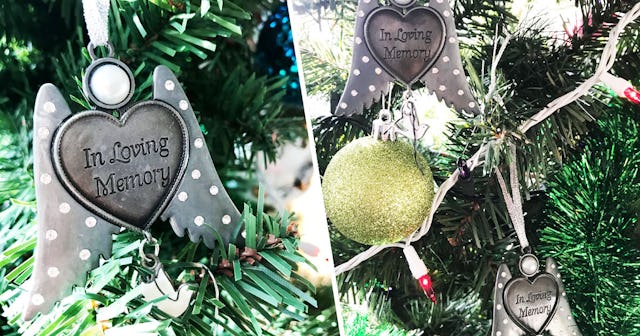How I Celebrate The Holidays With The Babies I Lost

Trigger warning: miscarriage, child loss
When people ask me how many children I have, I always say that I have two spunky little boys. The truth is I don’t have the courage to simply answer that I am actually a mom to five children – two on Earth and three angel babies in heaven. I find that conversations about miscarriages make others feel uncomfortable, a consequence of the stigma of pregnancy loss, which continues to silence women who are forever part of a sisterhood that no woman wants to be a part of in her lifetime.
I am part of that sisterhood and have been since 2014 when I suffered my first pregnancy loss. After the birth of my first son, I was adamant to put that loss behind me. Quite frankly, I did a pretty good job until my second and third losses in 2017. The trauma of the losses collectively became too much, and I found myself in therapy grappling with symptoms equated to post-traumatic stress disorder (PTSD). Even after the birth of my second healthy baby (after several rounds of fertility treatments), the nightmares and grief, coupled with postpartum hormones, set into motion an emotional tailspin that I couldn’t stop. And I refused to talk to friends or family, because the first rule of pregnancy loss is that you don’t talk about pregnancy loss, right?
Courtesy of Carla Roberts
At least that is the impression I got from the doctors and nurses tasked with my care. Since miscarriages are so common, there is this perception that women are supposed to pick up the pieces and move on to the next pregnancy. Truth be told, we are humans and miscarriages are still a loss no matter where you were in your pregnancy. Despite what many perceive, women don’t just simply dust herself off when she suffers a miscarriage. The pain, unbearable at times, lasts for months and even years.
When the people we love die, scripts that were set in motion generations before our lifetime help to guide us down the journey of grief. We have memorials, interments (depending on religious preferences and final wishes) and celebrations of life. Why should this be any different when we experience miscarriages?
Courtesy of Carla Roberts
This was the very question my therapist presented to me while we worked on a personalized script to help me cope, and ultimately, to accept the losses I had experienced. Ironically, other cultures do recognize pregnancy losses and help couples through the grieving process with ceremonies and even cemeteries dedicated to honoring babies lost before birth. The United States is an anomaly when it comes to these intimate practices, so women like me must improvise to find some closure. For me, it made sense to have my own rituals, so to speak, to remember the babies I lost early in my pregnancies.
Courtesy of Carla Roberts
One such ritual comes during the holiday season. I have three ornaments that go up on a Christmas tree every year. These ornaments signify each child I lost. The idea here is to celebrate the holidays with these three babies since they are forever part of our family and are forever part of my heart. The ornaments sit high on a tree that overlooks the neighborhood and the valley of the community where we as a family reside. I will admit, it hurts when I hang the ornaments on the tree – a subtle reminder of the babies I will never hold. However, knowing that each will be a part of our family during the holiday season does bring a sense of peace as my heart continues to grieve. In addition, we make a charity donation (“gifts” if you will) on behalf of each baby during the holiday season.
When my two boys are old enough, I will explain the symbolism behind the ornaments. In the meantime, these mementos of the babies I lost will remain on the tree for many Christmases to come.
This article was originally published on